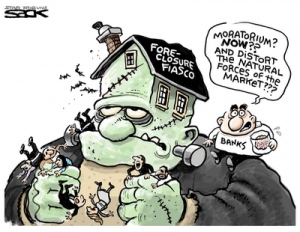Time to Break Up the Too-Big-To-Fail Banks?
 In January of 2009, I wrote a post called “Default Option.” My outrageous plan was to simply let the banks fail. Some people told me that was an unthinkable way to handle the financial meltdown, but I still think otherwise. Yes, it would have been rough. Bondholders and shareholders would have been wiped out, unemployment would have shot up, and lots of people would have lost money. Back then, I wrote, “In short, the incompetent banks would be liquidated and competent banks would take over the assets that are left behind. Instead, the pundits of Wall Street are basically telling America,” You make us (the banks) whole first, and then we will lend you your money back!” That is simply outrageous because we are rewarding the incompetent!!!!!!!” For the financial system to function normal again, the debt had to be flushed out and for good reason. I also wrote, “Letting the reckless banks fail will limit taxpayer exposure, preserve our capital, and our credit rating as a country. Bank failure will wash bad debt out of the system once and for all and protect the dollar from free fall. Finally, I think in the end it will be cheaper and more effective than what has and will be done in the future to “fix” the credit crisis.” (Click here to read the entire Default Option post.) We could have protected every depositor with less than $5 trillion dollars. We have already spent that much and more and still face the possibility of a sudden and out of control systemic failure.
In January of 2009, I wrote a post called “Default Option.” My outrageous plan was to simply let the banks fail. Some people told me that was an unthinkable way to handle the financial meltdown, but I still think otherwise. Yes, it would have been rough. Bondholders and shareholders would have been wiped out, unemployment would have shot up, and lots of people would have lost money. Back then, I wrote, “In short, the incompetent banks would be liquidated and competent banks would take over the assets that are left behind. Instead, the pundits of Wall Street are basically telling America,” You make us (the banks) whole first, and then we will lend you your money back!” That is simply outrageous because we are rewarding the incompetent!!!!!!!” For the financial system to function normal again, the debt had to be flushed out and for good reason. I also wrote, “Letting the reckless banks fail will limit taxpayer exposure, preserve our capital, and our credit rating as a country. Bank failure will wash bad debt out of the system once and for all and protect the dollar from free fall. Finally, I think in the end it will be cheaper and more effective than what has and will be done in the future to “fix” the credit crisis.” (Click here to read the entire Default Option post.) We could have protected every depositor with less than $5 trillion dollars. We have already spent that much and more and still face the possibility of a sudden and out of control systemic failure.
Today, best selling author and attorney Ellen Hodgson Brown delivers a long, but well written, piece on what it will take to finally fix our dysfunctional and mortally wounded financial system. Still, at the heart of the problem are the Too-Big-To-Fail-Banks. But because of the newly passed Financial Regulation bill, there may be a way to begin to finally put this mess behind us. Enjoy the article. –Greg Hunter–
———————————————-
By Ellen Hodgson Brown
Guest Writer for Greg Hunter’s USAWatchdog.com
Looming losses from the mortgage scandal dubbed “foreclosuregate” may qualify as the sort of systemic risk that, under the new financial reform bill, warrants the breakup of the too-big-to-fail banks. The Kanjorski amendment allows federal regulators to pre-emptively break up large financial institutions that—for any reason—pose a threat to U.S. financial or economic stability.
Although downplayed by most media accounts and popular financial analysts, crippling bank losses from foreclosure flaws appear to be imminent and unavoidable. The defects prompting the “RoboSigning Scandal” are not mere technicalities but are inherent to the securitization process. They cannot be cured. This deep-seated fraud is already explicitly outlined in publicly available lawsuits.
There is, however, no need to panic, no need for TARP II, and no need for legislation to further conceal the fraud and push the inevitable failure of the too-big-to-fail banks into the future.
Federal regulators now have the tools to take control and set things right. The Wall Street giants escaped the Volcker Rule, which would have limited their size, and the Brown-Kaufman amendment, which would have broken up the largest six banks outright; but the financial reform bill has us covered. The Kanjorski amendment—which slipped past lobbyists largely unnoticed—allows federal regulators to preemptively break up large financial institutions that pose a threat to U.S. financial or economic stability.
Rep. Grayson’s Call for a Moratorium
The new Financial Stability Oversight Council (FSOC) probably didn’t expect to have its authority called on quite so soon, but Rep. Alan Grayson (D-FL) has just put the amendment to the test. On October 7, in a letter addressed to Timothy Geithner, Shiela Bair, Ben Bernanke, Mary Schapiro, John Walsh (Acting Comptroller of the Currency), Gary Gensler, Ed DeMarco, and Debbie Matz (National Credit Union Administration), he asked for an emergency task force on foreclosure fraud. He said:
The liability here for the major banks is potentially enormous, and can lead to a systemic risk. Fortunately, the Dodd-Frank financial reform legislation includes a resolution process for these banks. More importantly, these foreclosures are devastating neighborhoods, families, and cities all over the country. Each foreclosure costs tens of thousands of dollars to a municipality, lowers property values, and makes bank failures more likely.
Grayson sought a foreclosure moratorium on all mortgages originated and securitized between 2005-2008, until such time as the FSOC task force was able to understand and mitigate the systemic risk posed by the foreclosure fraud crisis. But on Sunday, White House adviser David Axelrod downplayed the need for a national foreclosure moratorium, saying the Administration was pressing lenders to accelerate their reviews of foreclosures to determine which ones have flawed documentation. “Our hope is this moves rapidly and that this gets unwound very, very quickly,” he said.
According to Brian Moynihan, chief executive of Bank of America, “The amount of work required is a matter of a few weeks. A few weeks we’ll be through the process of double checking the pieces of paper we need to double check.”
“Absurd,” say critics such as Max Gardner III of Shelby, North Carolina. Gardner is considered one of the country’s top consumer bankruptcy attorneys. “This is not an oops. This is not a technical problem. This is not even sloppiness,” he says. The problem is endemic, and its effects will be felt for years.
Rep. Grayson makes similar allegations. He writes:
The banks didn’t keep good records, and there is good reason to believe in many if not virtually all cases during this period, failed to transfer the notes, which is the borrower IOUs in accordance with the requirements of their own pooling and servicing agreements. As a result, the notes may be put out of eligibility for the trust under New York law, which governs these securitizations. Potential cures for the note may, according to certain legal experts, be contrary to IRS rules governing REMICs. As a result, loan servicers and trusts simply lack standing to foreclose. The remedy has been foreclosure fraud, including the widespread fabrication of documents.
There are now trillions of dollars of securitizations of these loans in the hands of investors. The trusts holding these loans are in a legal gray area, as the mortgage titles were never officially transferred to the trusts. The result of this is foreclosure fraud on a massive scale, including foreclosures on people without mortgages or who are on time with their payments. [Emphasis added.]
Why Wasn’t It Done Right in the First Place?
That raises the question, why were the notes not assigned? Grayson says the banks were not interested in repayment; they were just churning loans as fast as they could in order to generate fees. Financial blogger Karl Denninger says, “I believe a big part of why it was not done is that if it had been done the original paperwork would have been available to the trustee and ultimately the MBS owners, who would have immediately discovered that the representations and warranties as to the quality of the conveyed paper were being wantonly violated.” He says, “You can’t audit what you don’t have.”
Both are probably right, yet these explanations seem insufficient. If it were just a matter of negligence or covering up dubious collateral, surely some of the assignments by some of the banks would have been done properly. Why would they all be defective?
The reason the mortgage notes were never assigned may be that there was no party legally capable of accepting the assignments. Securitization, in its origin, was a tax avoidance procedure, based on the formal difference between secured loans and sales. To qualify for the tax exemption, the conduits between the original lender and the investors could own nothing.
The problem was nailed in a class action lawsuit recently filed in Kentucky, titled Foster v. MERS, GMAC, et al. (USDC, Western District of Kentucky). The suit claims that MERS and the banks violated the Racketeer Influenced and Corrupt Organizations Act, a law originally passed to pursue organized crime. Bloomberg quotes Heather Boone McKeever, a Lexington, Ky.-based lawyer for the homeowners, who said in a phone interview, “RICO comes in because the fraud didn’t just happen piecemeal. This is organized crime by people in suits, but it is still organized crime. They created a very thorough plan.”
The complaint alleges:
53. The “Trusts” coming to Court are actually Mortgage Backed Securities (“MBS”). The Servicers, like GMAC, are merely administrative entities which collect the mortgage payments and escrow funds. The MBS have signed themselves up under oath with the Securities and Exchange Commission (“SEC,”) and the Internal Revenue Service (“IRS,”) as mortgage asset “pass through” entities wherein they can never own the mortgage loan assets in the MBS. This allows them to qualify as a Real Estate Mortgage Investment Conduit (“REMIC”) rather than an ordinary Real Estate Investment Trust (“REIT”). As long as the MBS is a qualified REMIC, no income tax will be charged to the MBS. For purposes of this action, “Trust” and MBS are interchangeable. . . .
56. REMICS were newly invented in 1987 as a tax avoidance measure by Investment Banks. To file as a REMIC, and in order to avoid one hundred percent (100%) taxation by the IRS and the Kentucky Revenue Cabinet, an MBS REMIC could not engage in any prohibited action. The “Trustee” can not own the assets of the REMIC. A REMIC Trustee could never claim it owned a mortgage loan. Hence, it can never be the owner of a mortgage loan.
57. Additionally, and important to the issues presented with this particular action, is the fact that in order to keep its tax status and to fund the “Trust” and legally collect money from investors, who bought into the REMIC, the “Trustee” or the more properly named, Custodian of the REMIC, had to have possession of ALL the original blue ink Promissory Notes and original allonges and assignments of the Notes, showing a complete paper chain of title.
58. Most importantly for this action, the “Trustee”/Custodian MUST have the mortgages recorded in the investors name as the beneficiaries of a MBS in the year the MBS “closed.” [Emphasis added.]
Only the beneficiaries—the investors who advanced the funds—can claim ownership. And the mortgages had to have been recorded in the name of the beneficiaries the year the MBS closed. The problem is who ARE the beneficiaries who advanced the funds? In the securitization market, they come and go. Properties get sold and resold daily. They can be sliced up and sold to multiple investors at the same time. Which investors could be said to have put up the money for a particular home that goes into foreclosure? MBS are divided into “tranches” according to level of risk, typically from AAA to BBB. The BBB investors take the first losses, on up to the AAAs. But when the REMIC is set up, no one knows which homes will default first. The losses are taken collectively by the pool as they hit; the BBBs simply don’t get paid. But the “pool” is the trust; and to qualify as a REMIC trust, it can own nothing.
The lenders were trying to have it both ways; and to conceal what was going on, they dropped an electronic curtain over their sleight of hand, called Mortgage Electronic Registration Systems or “MERS.” MERS is simply an electronic data base. On its website and in assorted court pleadings, it too declares that it owns nothing. It was set up that way so that it would be “bankruptcy-remote,” something required by the credit rating agencies in order to turn the mortgages passing through it into highly rated securities that could be sold to investors. According to the MERS website, it was also set up that way to save on recording fees, which means dodging state statutes requiring a fee to be paid to establish a formal record each time title changes hands.
The arrangement satisfied the ratings agencies, but it has not satisfied the courts. Real estate law dating back hundreds of years requires that to foreclose on real property, the foreclosing party must produce signed documentation establishing a chain of title to the property; and that has not been done. Increasingly, judges are holding that if MERS owns nothing, it cannot foreclose, and it cannot convey title by assignment so that the trustee for the investors can foreclose. MERS breaks the chain of title so that no one has standing to foreclose.
Sixty-two million mortgages are now held in the name of MERS, a ploy that the banks have realized won’t work; so Plan B has been to try to fabricate documents to cure the defect. Enter the RoboSigners, a small group of people signing thousands of documents a month, admittedly without knowing what was in them. Interestingly, it wasn’t just one bank engaging in this pattern of coverup and fraud but many banks, suggesting the sort of “organized crime” that would qualify under the RICO statute.
However, that ploy won’t work either, because it’s too late to assign properties to trusts that have already been set up without violating the tax code for REMICs, and the trusts themselves aren’t allowed to own anything under the tax code. If the trusts violate the tax laws, the banks setting them up will owe millions of dollars in back taxes. Whether the banks are out the real estate or the taxes, they could well be looking at insolvency, posing the sort of serious systemic risk that would bring them under the purview of the new Financial Stability Oversight Council.
No need for disaster
As comedian Jon Stewart said in an insightful segment called “Foreclosure Crisis” on October 7, “We’re back to square one.” While we’re working it all out, an extended foreclosure moratorium probably is in the works. But this needn’t be the economic disaster that some are predicting – not if the FSOC is allowed to do its job. We’ve been here before, and not just in 2008.
In 1934, Congress enacted the Frazier–Lemke Farm Bankruptcy Act to enable the nation’s debt-ridden farmers to scale down their mortgages. The act delayed foreclosure of a bankrupt farmer’s property for five years, during which time the farmer made rental payments. The farmer could then buy back the property at its currently appraised value over six years at 1 percent interest, or remain in possession as a paying tenant. Interestingly, according to Marian McKenna in Franklin Roosevelt and the Great Constitutional War (2002), “The federal government was empowered to buy up farm mortgages and issue non-interest-bearing treasury notes in exchange.” Non-interest-bearing treasury notes are what President Lincoln issued during the Civil War, when they were called “Greenbacks.”
The 1934 Act was subsequently challenged by secured creditors as violating the Fifth Amendment’s due process guarantee of just compensation, a fundamental right of mortgage holders. (Note that this would probably not be a valid challenge today, since there don’t seem to be legitimate mortgage holders in these securitization cases. There are just investors with unsecured claims for relief in equity for money damages.) The Supreme Court voided the 1934 Act, and Congress responded with the “Farm Mortgage Moratorium Act” in 1935. The terms were modified, limiting the moratorium to a three-year period, and the revision gave secured creditors the opportunity to force a public sale, with the proviso that the farmer could redeem the property by paying the sale amount. The act was renewed four times until 1949, when it expired. During the 15 years the act was in place, farm prices stabilized and the economy took off, retooling it for its role as a global industrial power during the remainder of the century.
We’ve come full circle again. We didn’t get it right in 2008, but with the newly empowered Financial Stability Oversight Council, we already have the ready-made vehicle to avoid another taxpayer bailout, and to put too-big-to-fail behind us as well.
———————————————————-
Ellen Brown wrote this article for YES! Magazine, a national, nonprofit media organization that fuses powerful ideas with practical actions. Ellen is an attorney and the author of eleven books, including Web of Debt: The Shocking Truth About Our Money System and How We Can Break Free. Her websites are http://www.webofdebt.com/articles/ , ellenbrown.com, and public-banking.com.













Greg
As usual great article with historical perspective. One of the problems with motivating the general public is that none of the dire predictions come true within the average person’s attention span.Still it would be a good idea to stop bailing out the banks which have essentially become criminal enterprises. Perhaps the file clerks and tellers are innocent; even the VP’s of whatever. At the executive levels it is a different story; they are consciously criminal in their extortionate behavior.
Repeal of Glass-Stegall will eventually be seen as one of the root causes of this depression. At the time I wondered how this could be beneficial or even prudent given the fairly recent Savings and Loan debacle. Allowing banks into the insurance and equity markets was an invitation to a sophisticated group of confidence men and women to join an unparalleled opportunity to loot the savings of the working and middle classes. This is nearly complete. The only action remaining is the nationalization (confiscation) of the still extant 401 (k) and similar accounts. This is not likely with a Republican majority. That alone is reason to vote for anyone not a Democrat.
Let the banks fail, restrict their activities to 1990 levels, abolish the Federal Reserve and fractional banking. This going to happen anyway, not for me as I am too old, but within 10 years the collapse will be complete.
John,
Even Clinton (42) know it was a mistake. Thank you for your participation in this site.
Greg
The Republican that’s a joke. Sen.Phil Gram republican who ram rod the repeal of the Glass Stegall act. Both parties suck , best started looking at the person not the party. PEACE
Amen Brother!
Greg
Greg, Great lead in and I like the new writer. Keep up the good work. I hate to say this but it is almost as if the Obamites are working to collapse the system BUT make sure their banker buddies cash out before it happens. When an original Confererate $10 note [yes, I’m from the south and you could get this stuff when I was a kid from a bubble gum machine for pennies] is worth more than a new U$D 20 note, it should cause concern
Thank you George and Diane. I did not know how Ellen would be received but now I do.
Greg
Hi Greg,
Ellen Hodgson Brown’s article explains the legal issues surrounding the foreclosure mess, and it’s very well written. For this topic, you might include some other scenarios, such as what the Federal Reserve might have up their sleeve, whether or not there may be a deeper plan to have created this mess in the first place (by those who might profit from a bailout), what may occur if the MBS market unwinds globally, or how ordinary citizens may have faith to purchase real estate again (that is, who might their lender be if they don’t engage in an all-cash purchase).
Thanks!
🙂 Diane
Thanks Greg your site is a good learning tool. Some people out in Seattle believe WaMu was set up by the bankers with WaMU OK a head of time, to be one of the failed banks when the house of cards fell. Maybe the mob bankers will see the insides of a jail someday.PEACE
Bob,
I think you folks up there in the Northwest are pretty smart!
Greg
Since the contract with the federal reserve is almost done, they can say”mission accomplished”. They did what they were created to do. All of this garbage going on is intentional. My father still reads the Wall Street Journal and watches the TV. He’s just another one of the brain-dead sheep that insists everything is fine. I don’t think he’ll be around long enough to see what they do when the debt actually becomes due. Once the creditors of the debt start collecting maybe people will start waking up. UNITED STATES is not a government. It is a corporation. A corporation that went bankrupt in 1933. Since we are operating under receivership everything you own, plus you and your childrens bodies, are the collateral. I pity everyone when they come to collect. Greg,I think you need to do an article on HJR-192 and the bankruptcy of 1933.
Bildo,
“United States is not a government. It’s a corporation.” Good stuff Bildo! Thank you.
Greg
Even if the debtors collect on the debt there are about 1,000,000,000,000 other problems to deal with.
-Peak oil?
-Carbon Footprint?
-Population Overgrowth?
-Food?
-Water Scarcity?
-Melting Icecaps?
-Depleted Resources?
These name a fraction of 1% of all the problems.
We live in a world, of rising populations, declining oil output, declining nonrenewable resources, with water scarcity, melting icecaps, and a significant rising carbon footprint… Oh yeah, can we fed that rising population?
This whole financial endgame is mute compared to all the other endgames. I guess what fascinates me, is how calm everything seems, in my part of the country. No-one is hitting the panic button. There is a rise in homeless people, but most of these people seem to have drug problems.
Good stuff Luke,
Greg
Someone said that there may not be enough attorneys to unwind this.
As Heather Boone McKeever said, ““RICO comes in because the fraud didn’t just happen piecemeal. This is organized crime by people in suits, but it is still organized crime. They created a very thorough plan.”
These banksters, and the government regulators involved, all need to go to jail. This may very well turn out to be, the biggest crime spree, ever in American history.
LostinMissouri,
I like Ms. McKeever! Thank you for this.
Greg
Greg,here it’s sat afternoon & I have read some very upsetting articles posted at http://www.caseyresearch.com/gsd/edition/silver-shortage-looms-rick-rule. Ed Steer has posted links that explain events that are going down world wide. It has some of the best articles about the MBS’s,one world government,the IMF new roll as the new world bank,and so mush more about what the heck Americans are facing very soon because the Power elites fear the rise of the Tea Party that is spreading & would be a danger to their plans they set in writing when Woodrow Wilson gave control to Federal Reserve in 1913.
Greg,I hope you find time to read the articles that Ed Steer put on his web site & then share your thoughts with all of America. It’s alot to ask of you, but I do not know when these evil elites will pull the switch on the INTERNET because of the ever growing strength of the Tea Party that is Spreading to out side of the USA to other Nations that are being attacked as we are! GOD BLESS YOU GREG & YOUR FAMILY & MAY YOU STAY STRONG UNDER GOD’S HAND!
M Smith,
Thank you for the comment and blessing!
Greg
“Rewarding the Incompetent”; isn’t that what our nation has devolved into?
As example I give the following: two out of three branches of federal government service without term limits-Judicial and Legislative (jobs for life); Corporate Executives that, once having acheived the magic leters: C-E-O, move from one feeding trough to the next, regardless of the results and in many cases disasters left in their wake; and perhaps most agregiously the media ‘talking heads’ who have lost the ideal of ‘observe, report, and question’ journalism for entertainment, ratings, and sesationalism.
The triggering events for a global, societal meltdown are rapidly coalescing: riots in France over benefit restrictions, protests in the UK over austerity planning, a 400K document ‘peek’ at the real, ugly side of the Iraq war, and probably a hundred other events that I am ignorant of. Just imagine if our congress would ever dare touch any of the ‘third rail’ issues here with any meaningful and long overdue reform. I for one do not think we will have to wait that long-the collapse will arrive much sooner.
Thanks Greg and contributors for the excellent writings, maybe like “Noah’s Ark” some will be saved to begin anew.
Troy,
Loved this line “maybe like “Noah’s Ark” some will be saved to begin anew.” Thank you for your comment!
Greg
: two out of three branches of federal government
THERE IS NO FEDERAL GOVERNMENT. United States is a corporation!!!!!
Bildo,
It sure looks that way to me too!
Greg
My kid use to bundle house loans into securities I ask him about the paper trail on who has the title he said out of a thousand house loans he might of had three without a complete trail in the bundle when he pass the paper work to the next step. He is just a young man but he said this idea of no proof of title is a small matter in the amount out there. We know it’s more about the worth of the securities that’s is the problem and who put the triple A rating on them. I don’t understand all this stuff but this banker kid of mine is honest and said this is what he say and did for a few years. When people ask me about my kids I say one turn out bad and the other one lives at home with no job like a normal kid.
Dear Greg,
Thank you for posting Ms. Brown’s column. However, she did miss some points that I’ve heard on talk radio (KVI), and that is that these foreclosure mavens were so greedy that they would pounce on language. That is, that if the LENDER goofed ever so slightly on the mortgage papers, then the LENDEE was at fault, and could have property foreclosed on! Also, that that member of the Federal Reserve, Bank of America, decided to ignore all calls for suspending foreclosures on homeowners. They’re doing it anyway, even though they are the ones who are the worst!
Woe on to anyone who thinks that government can “help,” as government has been so naked in its greed that it’s hard to tell where a corporation ends and government begins. Is this where Gerald Celente is right? Where those who have nothing, and have nothing left, will have nothing to lose? That we’ll finally have violent protests in the streets of America as well?
Thank you Sam and Mountainaires. I hope you will be seeing Ms. Brown’s work here again soon. She was a big hit with the readers here!
Greg
Love Ellen Brown, and bought her book Web of Debt. She’s a great teacher, or at least was for me. Glad to see her here, Thanks Greg! You have gathered some of my favorite writers,/economists/journalists to inform us all here. Such a great site!